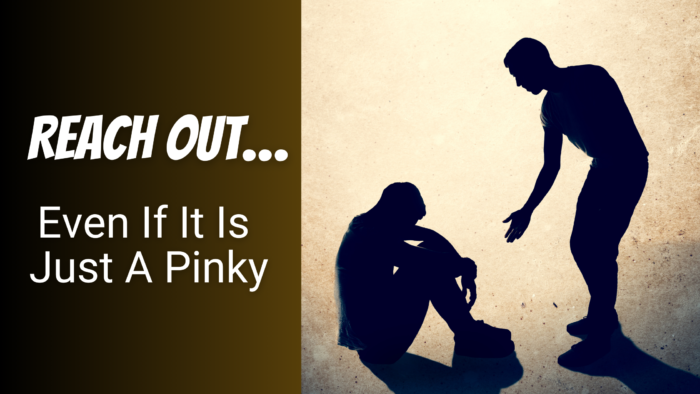By Donna Hoffmeyer
(original post on Medium, Taking Off The Armor)
A few years back I was taking care of a service member with significant PTSD from an ambush in the mountains of Afghanistan. One team member was killed, and several, including Mike (name changed for protection), was seriously injured. I was Mike’s clinical case manager. Over the years I worked with him, we developed a trusting and collaborative patient—case manager relationship.
He would often call when he felt anxious. This one particular day we were talking about the ups and downs of PTSD. I was saying it is okay to have peaks and troughs, as long as one did not unpack their bags in the trough. Mike was quiet for a moment and then said, “Ma’am, I agree. But, sometimes when you are all balled up at a low point, you do not even have the energy to raise a pinky; even when you know 50 hands are reaching out.”
That had to be about the best description of someone in the throws of their struggle. Yes, we were talking about PTSD, but as I thought about it, it really could apply to anyone at a low point in their life.
I am by no means trying to speak as an expert. Far from it. I am grateful I have never hit a point so low in my life that I felt the only option was death. I hope like hell I never do. I have had a situation where I felt like every single door and window closed around me. It is a pretty scary moment in one’s life when you see no way out.
I was fortunate, my darkness was for a very brief moment. A friend helped me see there was an option and I was able to crack a window. However, it was also a glimpse of how the downward spiral starts. I imagine if that feeling of hopelessness persisted for an extended period, my mind could have given up and wandered into places with potentially no return. The thought a mind could even go there is terrifying.
It made me reflect on my friends that were unable to find a sliver of light, and instead, succumbed to the darkness. How did all their doors and windows close shut? Could they not see the hands reaching out to them? Were they not strong enough to even lift a pinky for help? Were there enough hands reaching out?
It made me reflect on my friends that were in the darkness but found a sliver of light. What brought them back? Did someone see their pinky rise and quickly grabbed it? Was it their faith? Family? Friends? Or were they just too stubborn to let the darkness win? Personally, I don’t care what the reason was; I am just so damn thankful they fought and didn’t give in.
My best friend has seen more than her fair share of struggles. The details do not matter. What matters is that a few years back, she had hit a point so low in her life, she had gone so far as writing me a farewell letter. I never knew about it until recently, and it threw me sideways. I never knew she was so close to ending it all.
We’ve had a saying for the past 5 years when things were getting very tough for her. We called it “Mud and rope”. Whichever one of us was struggling, they were in the mud. The other person would never jump in the mud with them. (Really, what good did it do to have two people stuck in the mud?) Rather, the other person threw out as many “ropes” (resources) as they had available to the person stuck in the mud. It was the “mud” person’s job to grab the rope and pull themselves out.
This analogy did a few things. First, it allowed us to set boundaries we may have otherwise blurred in our effort to “help” the other one. Second, it always kept the person in the “mud” in a place of empowerment; reminding them they had resources to pull themselves out. Third, it reminded the person in the mud they were not alone. Someone was throwing them ropes and cheering them on.
In a previous blog, I wrote about society collectively needing more than a little empathy to make an impact on the suicide rate. They need to meet people where they are at; a statement I still stand by. However, like with anything in life, there is a reciprocation that must occur for an optimal outcome.
I was part of a team comprised of civilian and military medical/mental health providers, clinical and non-clinical case managers, recovery care coordinators, and commanders that took care of a service member having some of the most complex mental and medical health conditions. He raised his pinky numerous times over the 3 ½ years but could get no further. Even with all the resources made available to him, he was in a continuous slow downward spiral. Unlike Mike, who used those ropes, and is thriving, he was never able to grab a single rope and pull himself out.
I challenge those of you struggling. What are you doing to shed even a tiny flake of light into your darkness? Do you have your person(s) throwing you ropes? If you are not able to grab them right now, do you have enough energy to raise a pinky? You may be surprised to find how many people around you are reaching out, ready to grab you, until you can reach a rope.
Don’t give up. You are too valuable.


